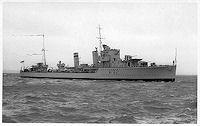 The David vs. Goliath naval battle between destroyer HMS Glowworm and the heavy cruiser Admiral Hipper
The David vs. Goliath naval battle between destroyer HMS Glowworm and the heavy cruiser Admiral Hipper
By John Dudek @ The Wargamer
A fierce Force 10 late winter gale blew across the icy, storm swept Norwegian Sea on the early morning of 7 April 1940 as the solitary British destroyer HMS. Glowworm, badly hit and blazing brightly from numerous shell hits from German heavy cruiser and destroyer gun fire emerged from behind her own smokescreen to confront her five attackers. She was now running at a full flank speed of 38 knots to present an impossible and nightmarish spectacle to the nearby German heavy cruiser Admiral Hipper. Many of Hipper’s crewmen’s jaws dropped open in shock and awe at what was about to befall them. The heavy cruiser had already successfully dodged 2 salvos of Glowworm’s torpedoes, before hitting the British destroyer a number times with her main and secondary gun batteries, setting the ship afire. Glowworm’s Captain Lt. Commander Gerard Roope, noting Hipper’s position, now deliberately cut across the cruiser’s bow, before putting his helm hard over to deliberately ram the cruiser. Glowworm’s bow slammed into the Hipper just abaft her anchor, scrapping along its starboard side for over 150 feet, The collision ripped away both most of Glowworm’s own bow and a good deal of armor plate from the Hipper’s side. One of Hipper’s torpedo mounts was sheered away overboard and the cruiser shipped over 500 tons of seawater through the rents in her hull, but was able to contain the damage. Not so the Glowworm. Even though ablaze from stem to stern a few of her guns were still in action as she continued to hurl their hatred at the German enemy. The out of control fires quickly reached the destroyer’s ammunition magazine and the ship exploded in a fitful roar to capsize and quickly disappear into the Norwegian Sea’s dark, icy depths. Of Glow-worm’s crew of 146 men, only 40 souls survived to be plucked out of the near frozen water by Hipper’s crew. Lt Commander Roope was momentarily one of those few survivors. He grabbed at one of the life lines thrown to him, but exposure and fatigue overcame him and he dropped back into the water to disappear into its depths, never to be seen again. He later was awarded the Victoria Cross posthumously. When regarding fighting men of this bravery and caliber, one tends to immediately think of the adage of the Emperor Napoleon who said: “Audacity, audacity, above all audacity.”

